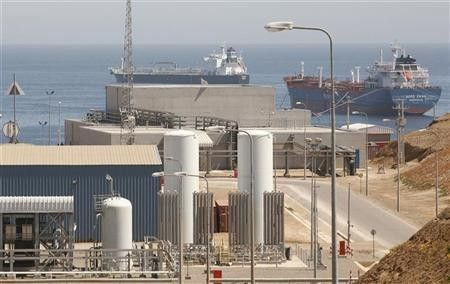Energy Department Approves One More LNG Export Application, Seven Now Approved

The Obama administration conditionally authorized an energy facility in Oregon to export liquefied natural gas (LNG), the agency announced Monday, adding one more license to six that allow companies to export LNG to countries without a free trade agreement with the U.S.
The approval, which was next in line on a closely watched list of 24 current applications, allows Jordan Cove Energy Project in Coos Bay, Ore., to export LNG at a rate of 800 million standard cubic feet per day for 20 years. But to liquefy natural gas on such a large scale, the company will still need federal approval from the Federal Energy Regulatory Commission (FERC), which should issue a draft environmental impact statement in April or May and a final statement by the end of the year, according to Jordan Cove’s public affairs director Michael Hinrichs. The DOE has worked on the approval for two years.
The Natural Gas Act requires the energy department to grant export authorizations unless the proposed exports would not be “consistent with the public interest.” The facility, owned by Veresen Inc., won approval to export LNG to the 20 Free Trade Agreement countries in December 2011.
Of the seven LNG export licenses the Department of Energy has approved to non-Free Trade Agreement countries, only one has final federal approval from FERC so far: Sabine Liquefaction, LLC, in Sabine Pass, La.
Still, Jordan Cove is one step closer to final approval.
“Receipt of DOE approval to export to U.S. non-FTA countries completes a key development milestone for Jordan Cove and brings us one step closer to making a final investment decision,” said Elliot Trepper, president of Jordan Cove. “The next critical path item, from a regulatory perspective, is authorization from the U.S. Federal Energy Regulatory Commission to commence construction.”
Several lawmakers with oil and gas industry support applauded the new permit.
"The Department of Energy's approval of the Jordan Cove LNG export terminal in Southern Oregon is necessary to create more high-paying jobs in America and to solidify the U.S. as an energy superpower,” Sen. Mary Landrieu, D-La., said in a statement Monday. “A quick and efficient approval process to responsibly export natural gas from our shores will also reduce the stronghold that countries like Russia currently exercise over their neighbors.”
Sen. Ron Wyden, D-Ore., former chairman of the Senate Committee on Energy and Natural Resources, had pushed the DOE to review Jordan Cove’s application.
“This announcement is exactly what Coos Bay, North Bend and America need: new jobs and new investment, while factoring in a changed geopolitical landscape through a case-by-case process,” Wyden said in a statement. “Priority one for me has always been ensuring American jobs and employers see the full benefits of the natural gas renaissance. The Department of Energy must monitor markets closely and be prepared to adjust course should any threat to American jobs or energy security emerge.”
© Copyright IBTimes 2025. All rights reserved.






















